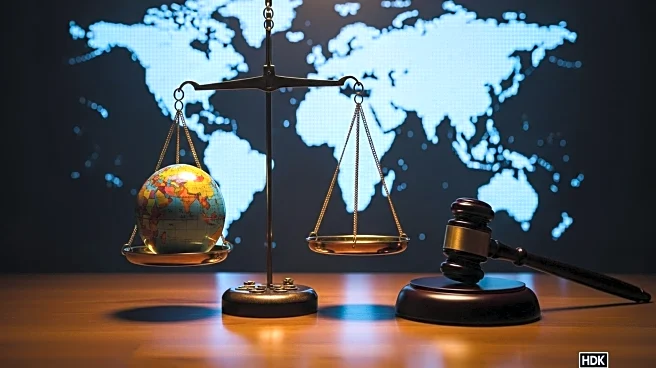What's Happening?
The U.S. Court of Appeals for the Federal Circuit has recently ruled that many of the blanket tariffs imposed under the International Emergency Economic Powers Act (IEEPA) exceed presidential authority. This decision questions the extent of the president's power to unilaterally impose wide-ranging import duties. President Trump had previously issued Executive Order 14257, declaring a national emergency over the U.S. trade deficit and imposing reciprocal tariffs on various imports. A subsequent executive order on September 5, 2025, modified the scope of these tariffs, adding and removing goods such as bullion, medicines, and strategic minerals from tariff lists. The proposed Trade Review Act of 2025 seeks to restore Congressional authority over new or revised tariffs, requiring notification, economic impact analysis, and Congressional approval.
Why It's Important?
This development is significant as it impacts U.S. expats who may face increased costs for imported goods due to higher tariffs. The ruling could lead to reversals or modifications of existing tariffs, affecting tax returns and financial planning for expats. The legal challenge to executive power may result in changes to trade policy, influencing the profitability and taxation of income sources related to trade. Expats involved in importing or exporting goods may need to adjust their financial strategies and tax filings in response to these changes. The broader implications include potential shifts in U.S. trade policy and executive authority, affecting international trade relations and economic strategies.
What's Next?
If the Trade Review Act of 2025 passes, it will require Congressional oversight for new tariffs, potentially altering the current trade policy landscape. Expats should stay informed about legal rulings and executive orders that may affect tariffs and trade taxes. They may need to consult legal or tax professionals to navigate the complexities of trade law and U.S. expat tax regulations. The possibility of tariff reversals or refunds necessitates careful documentation and record-keeping for those affected by these changes.
Beyond the Headlines
The legal challenge to presidential tariff powers highlights the ongoing debate over executive authority and constitutional boundaries. This case may set a precedent for future challenges to executive actions related to trade and economic policy. The implications extend beyond immediate financial impacts, potentially influencing the balance of power between the executive and legislative branches in shaping U.S. trade policy.










